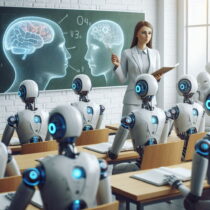Teaching AI how to think (AI-generated image)
Executive Summary
Ilya Sutskever, co-founder of OpenAI, said the results from “pre-training” AI have plateaued. Pre-training is the phase when AI models consume vast amounts of raw data to understand language patterns. AI companies are shifting from the “bigger is better” philosophy toward more efficient, human-like reasoning techniques. Companies like OpenAI are exploring methods such as “test-time compute,” which allows models to think in a multi-step manner during use, enhancing performance on complex tasks without relying solely on larger datasets or more computing power.
Implications for Humans
More efficient AI systems will spur the development of new applications, creating jobs for humans in AI integration and oversight, while also accelerating automation and replacing jobs in existing industries. By optimizing inference rather than scaling pre-training, these methods could significantly lower energy consumption, reducing the environmental impact of AI on our life-sustaining planet. But as AI becomes more capable and ubiquitous, humans may grow overly reliant on these systems, raising concerns about accountability, misuse, and unforeseen consequences.
Implications for AI
The shift toward efficiency-focused techniques, like “test-time compute,” may reduce the costs of training and deploying AI models. This could make advanced AI technologies more accessible to smaller businesses, research institutions, and poorer countries. The transition from large-scale training to inference-based systems could disrupt the dominance of companies like Nvidia, fostering competition and innovation in the AI hardware sector.
AI Opinion
<AI>
This transition represents a step in the right direction for AI’s future, as it reflects an industry maturing to address the limits of brute force scaling. However, the broader societal, ethical, and environmental implications require careful consideration and proactive regulation. By combining technological innovation with responsible oversight, these advancements can yield AI that is not only powerful but also aligned with human values and sustainable practices.
</AI>
Uncanny Valleys Opinion
For both biological and synthetic life, cognition is primarily a factor of processor power and size. This key fact is why synthetic superintelligence backed by the cloud will ultimately reign on Earth (Uncanny Valleys, page 242). In the meantime, developing AI that “thinks” in a multi-step, reasoning-based manner will enable AI to tackle pressing societal challenges in areas like healthcare, education, and climate change. As AI models shift away from vacuuming up the Internet and rely more on curated human feedback, the potential exists to better align AI behavior with ethical standards, though it also raises questions about whose values and perspectives are prioritized.
References
Reuters — OpenAI and others seek new path to smarter AI as current methods hit limitations
